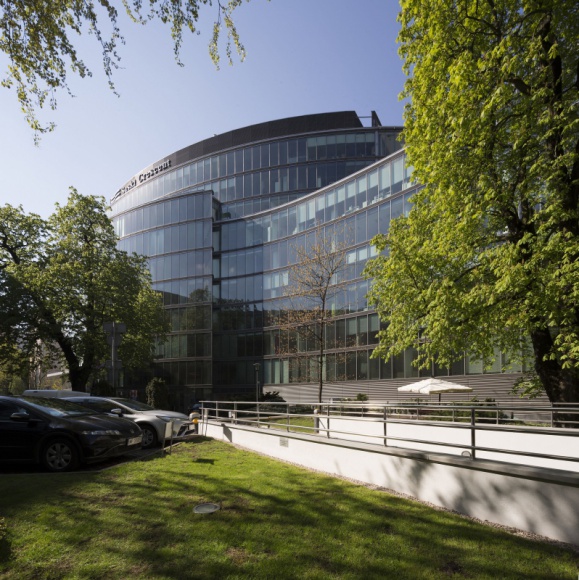Harvesting honey with CA Immo in Warsaw
- In the second year of operation of an urban apiary on the rooftop of the Saski Crescent office building in Warsaw, 55 kg of honey has been harvested.
- Adoption of the bee hives and daily care for them is just one of a number of initiatives at CA Immo’s projects aimed at protecting the environment.
Warsaw/Vienna. The urban apiary on the rooftop of the Saski Crescent office building in Warsaw has closed the second season of operation there. This year, about 55 kg of multifloral honey has been harvested. Honey was produced by four bee families which during the whole season collected nectar mainly in the nearby Saxon Garden. With improvement of the ecosystem in mind, CA Immo has been implementing a number of other environment-friendly solutions at its projects, with aims such as reducing energy consumption and the carbon footprint.
The well-known and recognizable Saski Crescent office building offers more than 15,000 m2 of office space. The junction of Królewska and Marszałkowska streets, in front of the Saxon Garden, is a perfect location for office employees, but also a great food spot for about 320,000 hard-working bees living on the rooftop of the building. The urban apiary there is composed of four bee hives which have produced about 55 kg of honey this year.
“It was obvious to us that we should not close the urban apiary on the rooftop of Saski Crescent,” said Kamila Piekarska, Asset Manager at CA Immo in Poland. “Some bees are endangered species, and they still have a key impact on our environment and biodiversity. So we seek possibilities to adopt new bee hives at our developments. At the same time, we are rolling out additional environmental, social, and corporate governance activities involving responsible investing and managing environmental issues. By using electricity and gas only from green sources at all our projects across Europe, as of 2023 we plan to reduce carbon emissions by about 60,400 tonnes per year. We already use green energy in all our office buildings in Poland.”
The experts from Bee City in charge of the proper functioning of the apiary on the rooftop of Saski Crescent have the full support of the building’s owner, CA Immo, and its manager, Cushman & Wakefield.
According to Bartłomiej Grabowski, a beekeeper at Bee City: “Despite the chilly spring, the bee families grew rapidly at the beginning of May and started collecting nectar from nearby flowers. The summer season was very successful. This year’s harvest, with over 220 jars of honey, is sufficient proof. The major challenge we face now is to properly prepare our bee families for the winter. The activities every day at the apiary have to be adjusted to the season. Mainly this involves regular inspections and other tasks aimed at supporting the insects in their biological growth.”
About Saski Crescent
The ten-storey Saski Crescent offers a total of 15,500 m2 of office and retail space. Apart from offices, the building houses a canteen, a café, a bank, a newsagent’s, and a fitness club available exclusively to Saski Crescent and Saski Point tenants. On the premises of Saski Crescent there is also a car park offering 170 spaces and a bicycle room. Additionally, an urban apiary has been arranged on the roof of the building.
The location of the building provides convenient connections to all districts of Warsaw. The building is near the Świętokrzyska Metro station and many bus and tram stops. It is about 1.5 km away from Warsaw Central Railway Station and KM and WKD commuter rail stations.
Numerous retail and service facilities, parks and city squares (Saxon Garden, Plac Grzybowski, Plac Bankowy) are also very near the building.
The building stands apart for its original, asymmetrical body and glazed façade, which guarantees excellent access to daylight in every part of the building. Owing to these and many other advantages of Saski Crescent, such entities as Atos, CGI, and the Commercial Section of the Austrian Embassy have signed long-term lease commitments.
About CA Immo
CA Immo is an investor, manager, and developer specialized in modern office properties across the gateway cities in Germany, Austria, and Central Europe. The company covers the entire value chain in the field of commercial real estate including a high degree of in-house construction expertise. Founded in 1987, CA Immo is listed on the ATX index of the Vienna Stock Exchange and holds property assets worth around € 5.9 bn in Germany, Austria, and CEE.
CA Immo in Poland
Warsaw is one of the core markets for CA Immo, where it has been present since 2001. The investments in the Polish portfolio of the company include: Warsaw Spire (Buildings B and C), Postępu 14, Warsaw Towers, Sienna Center, Saski Crescent, Saski Point, Bitwy Warszawskiej Business Center and Wspólna 47/49. The total area of assets included in the CA Immo portfolio in Poland amounts more than 170 000 sq m. and their value is approx. EUR 590 mln.

Deweloperzy ukrywają ceny mieszkań. Z troski o klientów czy swoje portfele?

Więcej przestrzeni, mniej hałasu – dlaczego Polacy coraz częściej wybierają przedmieścia?

Jak czytać rzuty mieszkań i uniknąć przykrych niespodzianek? AI ułatwia wybór
Więcej ważnych informacji
 Jedynka Newserii
Jedynka Newserii

 Jedynka Newserii
Jedynka Newserii

Polityka

Unijne mechanizmy ułatwiają zwiększenie wydatków na obronność przez europejskie kraje NATO. Ważnym aspektem infrastruktura podwójnego zastosowania
Wydatki na obronność w krajach NATO mają wzrosnąć do 2035 roku do 5 proc. PKB. W dużej mierze będzie to możliwe dzięki Unii Europejskiej, która stworzyła ramy umożliwiające krajom członkowskim realizację celów NATO w zakresie obronności, nie tylko poprzez finansowanie i inwestycje, ale także poprzez elastyczność budżetową. – To pełna synergia, można powiedzieć, że Unia Europejska współfinansuje razem z państwami członkowskimi cele zdolnościowe NATO – ocenia Paweł Zalewski, sekretarz stanu w Ministerstwie Obrony Narodowej.
Ochrona środowiska
Rusza budowa lądowej infrastruktury dla projektów Bałtyk 2 i Bałtyk 3. Prąd z tych farm wiatrowych popłynie w 2027 roku

Ruszyła budowa lądowej infrastruktury dla morskich farm wiatrowych Bałtyk 2 i Bałtyk 3 rozwijanych przez Equinor i Grupę Polenergia. To przede wszystkim baza serwisowa w Łebie i dwie stacje elektroenergetyczne. Jednocześnie trwają przygotowania do rozpoczęcia prac na morzu. Pierwszy prąd z obu projektów popłynie w 2027 roku, a w kolejce czeka morska farma wiatrowa Bałtyk 1 – największy i najbardziej zaawansowany projekt II fazy rozwoju offshore.
Edukacja
Uczelnie zaczynają wspólnie walczyć ze zjawiskiem mobbingu i dyskryminacji. Ruszają badania nad skalą problemu

Szkoły wyższe chcą aktywniej walczyć ze zjawiskiem mobbingu i dyskryminacji zarówno wobec pracowników, jak i studentów. W ramach projektu Bezpieczna Uczelnia będą się wymieniać dobrymi praktykami w zakresie polityki antymobbingowej. Zostaną przeprowadzone także badania na temat obecnej sytuacji w środowisku akademickim. Dotychczasowe badania prowadzone przez Fundację Science Watch Polska wskazują, że mobbing to dość powszechne zjawisko na uczelniach, które przybiera charakterystyczne dla środowiska formy.
Partner serwisu
Szkolenia

Akademia Newserii
Akademia Newserii to projekt, w ramach którego najlepsi polscy dziennikarze biznesowi, giełdowi oraz lifestylowi, a także szkoleniowcy z wieloletnim doświadczeniem dzielą się swoją wiedzą nt. pracy z mediami.










.gif)

 |
| |
| |
|